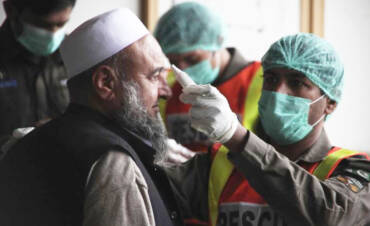One of the most deadly things in 2020 was coronavirus; however, Pakistan has controlled it quite effectively. Recently, government-led research in collaboration with other organizations has claimed that almost 11% of Pakistanis have developed protective immunity against the lethal COVID-19 as known as coronavirus.
[adinserter block =”3″]
A study conducted in 25 cities shows that almost 11% of Pakistanis have developed protective immunity across the country against coronavirus.
The Health Services Academy in cooperation with various partners initiated the seroprevalence research in July; the report cited the positive calculations. Moreover, a prominent partner is the Aga Khan University (AKU). The study also got technical support from the World Health Organisation (WHO).
Pakistanis Protective immunity against Coronavirus
On Friday the health ministry released a press release and said, “It was estimated that almost 11% of Pakistanis have developed protective immunity across Pakistan. It means that every 10th Pakistani has developed antibodies in their blood against COVID-19 virus.”

Source: Facebook
In addition, the ministry said the research discovered that seropositivity was more in urban areas compared to rural regions. Moreover, it also told that those who had contact with a corona positive person were more prone to have antibodies.
“It was more common in young adults and significantly less in children and older adults,” said the statement. The statement continued that the study findings backed other inquiries that recognized that older people were at the highest jeopardy from a likely second wave.
[adinserter block =”10″]
“It was also found out in the study that the use of mask and frequent handwashing in the month of July was up to approximately 60% and 70% of the population, respectively,” said the ministry. Furthermore, it said that the results presented the significance and favorable outcome of the awareness drives which the government took in the start.
Is there still a risk?
Nevertheless, the research added that districts with lower immunity rates may be at greater risk in the second wave COVID-19. It continued that there was a requirement for enhanced health services, especially in rural areas.
“While further data analysis is being carried out the experts proposed conducting regular seroprevalence surveys to map the evolving spread and exposure to COVID-19 and perform pooled data analysis (combining data from other such studies) conducted in Pakistan for a more in-depth analysis.”
[adinserter block =”4″]
Besides, the ministry added that seroprevalence investigations were conducted to evaluate; as to what portion of the Pakistanis have developed protective immunity to the coronavirus. Moreover, the statement continued that the “findings of the study will be used for policy decisions.”
To conclude, the lethal pandemic of coronavirus is becoming less deadly in the country. Pakistanis have clearly learnt their lessons from the pandemic.
What do you think of the story? Please, let us know in the comments section below!







